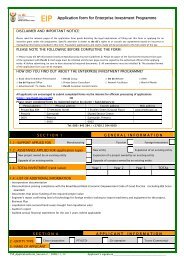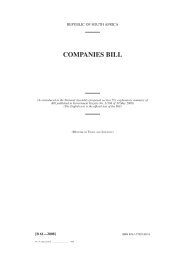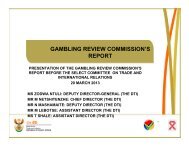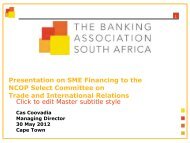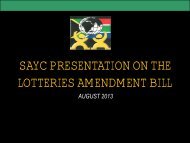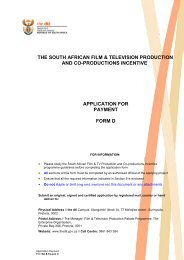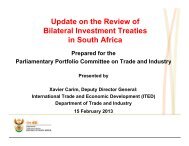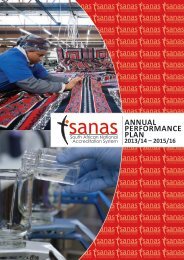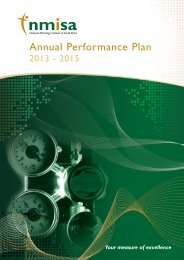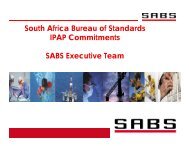Copyright Review Commission Report - ICT Law and Regulation ...
Copyright Review Commission Report - ICT Law and Regulation ...
Copyright Review Commission Report - ICT Law and Regulation ...
- No tags were found...
Create successful ePaper yourself
Turn your PDF publications into a flip-book with our unique Google optimized e-Paper software.
Aspects of Intellectual Property Rights (the TRIPS Agreement), which is also based on the principle of nationaltreatment. Nationals of other parties enjoy copyright protection no less favourable than that given by a WorldTrade Organisation (WTO) member to its own nationals.3.1.7. The British <strong>Copyright</strong> Act of 1911 (which had statutory force in South Africa as it was printed in the thirdschedule of our Act 9 of 1916) brought all the different copyrights under one statutory roof. Section 5 providedfor a statutory term of the author's life plus 50 years (the minimum prescribed in the Berne Convention). It alsoinvalidated inter vivos assignments by authors of their works as well as licences to publish such works in so faras concerned the second half of the 50-year period after the author's death. This provision was enacted out of aconcern for the dependants of deceased authors. It was not re-enacted in the 1965 Act (following in this regardthe 1956 British <strong>Copyright</strong> Act (4 & 5 Eliz. 2, c.74), which repealed the 1911 Act as it applied in Great Britain,with the result that the protection granted thereby only applies in the case of works made before 11 September1965 (when the 1965 Act came into operation) by authors <strong>and</strong> composers who died less than 50 <strong>and</strong> more than25 years ago. (This provision was invoked by Prof. Owen Dean to obtain royalties for the heirs of the lateSolomon Linda, who composed the Imbube song in 1939.) The CRC was informed that currently no attempt isbeing made to collect royalties on behalf of heirs of other South African composers to whom Section 5 of the1911 Act applies. The <strong>Commission</strong> recommends that this omission be rectified.3.1.8. The 1911 Act (Section 19) also gave what it described as a ‘copyright’ right to the producers of soundrecordings to prevent reproductions of their recordings. This right was later held to include the right to preventpublic performances of recordings: see Gramophone Co v Cawardine [1934] Ch. 450. This right was not strictlya ‘copyright’ right because it was not, as Prof. WR Cornish put it (Intellectual Property: Patents, <strong>Copyright</strong>,Trade Marks <strong>and</strong> Allied Rights, [7th ed., para. [ 9-08]):... conferred upon the ‘executant’ artist whose performance was recorded, but upon the business which organised therecording. It was not thus an author's right at all, but something which continental theory would scrupulously distinguishas a ‘neighbouring right’. An important precedent was thus set for an age that was to see a great increase in thetechnical possibilities for artistic expression.The 1965 Act followed the 1956 British Act in adding three new forms of entrepreneurial copyright to that ofsound recordings recognised in the 1911 Act. These included copyrights in cinematograph films (Section 14(1)),broadcasts (Section 15(1)) <strong>and</strong> published editions, i.e. the typographical arrangement thereof (Section 16(1)).3.1.9. Unlike the entrepreneurs, performers had to wait much longer to receive protection. As Owen Morgan(International Protection of Performers' Rights, 2002, p1) points out:... in the absence of technology: (i) a performance exists past the time of its presentation only in the memory of aspectator physically present when the performance was given; <strong>and</strong> (ii) the communication of a performance is limited tothe spectators physically present in the immediate vicinity of the performance at the time it is presented.Performances in consequence were transitory. Mr Justice Arnold (Performers' Rights, 4 ed, p17, para. 1.42)says:- 14 -



